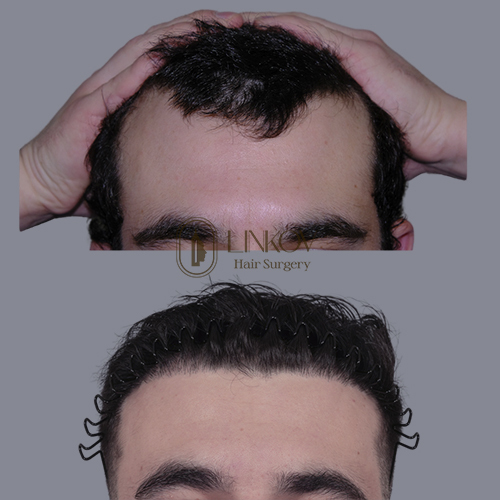NYC Male Hair Loss Treatments
Schedule a consultation today with the best doctors in New York City if you’re interested in receiving the best hair loss treatment for men. Whether you’re curious about your options or finally ready to take the leap, get the best hair regrowth for men at Linkov Hair Surgery in Manhattan. The top hair restoration surgeons listen to your concerns and your goals before developing an effective treatment plan that fits your budget and helps you realize your goals. Call today for a consultation.

What Treatment Options Are Available for Male Hair Loss?
The good news is that there are a variety of options in hair loss treatment for men to slow hair loss and stimulate hair growth for men. The best hair loss treatment for men depends on several factors, such as what’s causing your hair loss and how much hair you’ve lost.
Hair loss is common in men. For many, it’s not a welcome experience. If you feel self-conscious about bald areas or a receding hairline, you may try to cover it up by wearing a cap or a toupee. Because of the impact that hair loss can have on your self-esteem, you may opt for the male pattern baldness treatment that’s best for you.
There are both surgical and non-surgical hair growth options, all designed to regrow hair for men. If you’re feeling less confident in life because of bald patches or thinning hair, consult the experts in men’s’ hair loss treatment at Linkov Hair Surgery in Manhattan to find out the best treatment for hair regrowth in men.


What Causes Hair Loss in Men?
The aging process contributes to hair loss in many cases, but it’s not the only thing that can causes men to lose their hair. Some men start to lose hair as early as their late teens or early twenties. Other causes of hair loss in men include:
- Heredity The tendency to lose hair with age often runs in families. This type of hair loss is known as androgenic alopecia and can happen to both men and women. Male pattern baldness and female pattern baldness fall in this category.
- Medications Some medications cause hair loss as a side effect. This includes certain medications used to treat cancer, depression, arthritis, gout and high blood pressure.
- A physical or emotional shock A traumatic experience may cause rapid hair loss in a short amount of time, which is known as telogen effluvium. When this happens, it’s usually temporary.
Additionally, some medical conditions can trigger hair loss. One example is an autoimmune disorder in which your immune system attacks hair follicles, a condition that’s known as alopecia areata. You can lose hair anywhere on your body if you have this condition, and it may even cause patchy hair loss. Other medical conditions that can contribute to hair loss include:
Your NYC doctor diagnoses the cause of your hair loss after a physical examination, an evaluation of your medical history and an enquiry about the medications you’re taking. Blood tests may be necessary if your doctor suspects that the cause of your hair loss is related to a medical condition.

What Medications Are Used in Male Pattern Baldness Treatment?
Male pattern baldness is characterized by a receding hairline or thinning at the top of the head. Many men turn to medications as the first form of treatment. After a thorough exam, the best doctor in men’s hair loss treatment may recommend prescription-strength medication for your male pattern baldness, such as:
Minoxidil This medication, often sold under the brand name Rogaine, is available without a prescription and comes as foam, liquid or shampoo. It slows hair loss and regrows hair. It may also strengthen the strands of hair you have. You should apply it to your scalp twice daily for best results. Some men respond better to this product than others, and some may see no improvement at all from using it.
Finasteride This medication requires a prescription, but may be recommended for men with male pattern baldness. It’s a pill that you take daily on a long-term basis. As many as nine out of 10 men find that hair loss slows down with the help of finasteride, often sold as Propecia. There may be some regrowth if you start this medication soon after noticing signs of hair loss.
Both medications are FDA-approved. Be ready to wait for results. It may take six months or longer to see changes from this treatment, regardless which of these medications you use.
Is a Hair Transplant a Good Choice for Men’s Hair Loss Treatment?
Hair loss can be either temporary or permanent. If your hair loss is permanent, you’re likely looking for a permanent solution, which is what a hair transplant provides. A hair transplant is a surgical procedure that makes the most of the hair you have left. Options in hair transplant procedures include:
- Follicular unit transplantation A FUT procedure is accomplished by removing a strip of skin from the back of your scalp and removing individual hair follicles from the strip to transplant where your hair loss treatment is needed.
- Follicular unit extraction In a FUE procedure, individual hair follicles are moved from the back of your head to the area where treatment is needed.
A hair transplant may be recommended if other men hair loss treatment options have failed. Hair transplants done by a top surgeon trained and experienced in hair loss treatment for men results in natural-looking hair permanently.
What Other Options Are There for Men Hair Loss Treatment?
There is no one-size-fits-all treatment for male pattern baldness. Your treatment must address any underlying issues, as well as help you reach your goals. Other hair loss treatment for men options to consider include:
Platelet-rich plasma (PRP) injections Platelets are a component of your blood that promotes cell growth and regeneration. They’re more concentrated in PRP than in blood. When PRP is injected into your skin after microneedling therapy, it promotes hair growth in men with androgenetic alopecia, usually in combination with minoxidil or finasteride. This is not a permanent treatment and needs to be repeated every few months.
Laser therapies Treatment with low-level laser energy stimulates hair growth. Some laser devices are available to treat hair loss at home, but your NYC doctor may recommend you try this option in the office. If you do buy a home treatment kit, look for a device that says “FDA cleared” on the label.
Some men experience anxiety or depression because of hair loss, while others aren’t bothered by it at all. The decision to obtain treatment for hair growth for men is a personal one. The best results from hair loss treatment for men are obtained when treatment is sought soon after hair loss begins.
The many different choices to regrow hair for men can be confusing, which is why you need to consult top doctors who are experienced in treatment for male pattern baldness. Find out what type of hair loss you have and the most effective treatment approach in your case. Contact the best choice for hair loss treatment in NYC at Linkov Hair Surgery, where you’ll find the most up-to-date treatment options at the best price.
Linkov Hair Surgery
150 E 56th St, #1A
New York, NY 10022
(212) 970-9404

